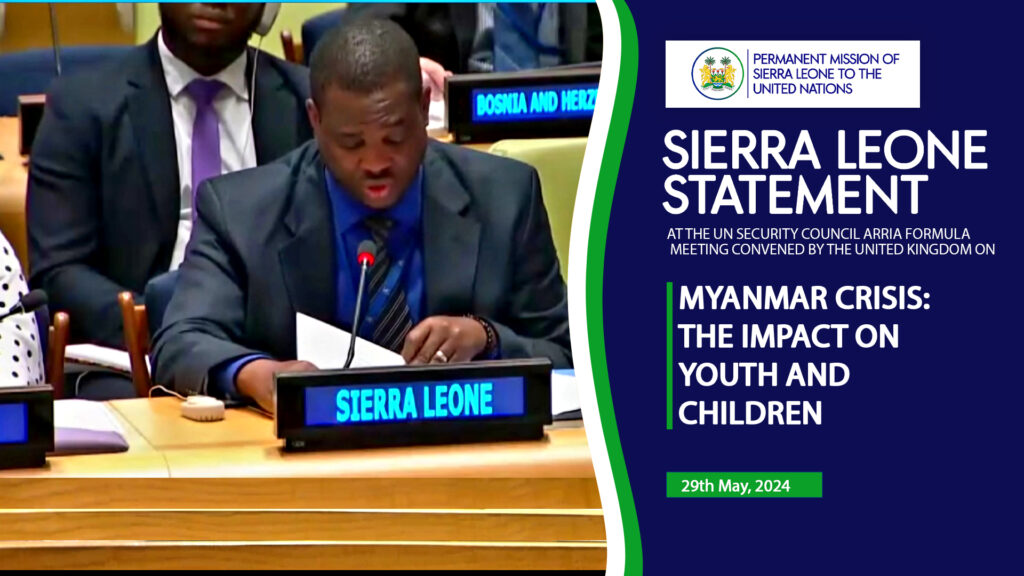BY
MR. ALAN E. GEORGE
MINISTER COUNSELLOR/ POLITICAL COORDINATOR
Mr./Madam Chair
I thank you for convening this meeting and we thank the United Kingdom for continued attention to the situation in Myanmar.
We also thank UNICEF Director of Emergency Operations Lucia Elmi for the comprehensive update on the situation in Myanmar.
Mr./Madam Chair
Sierra Leone remains deeply concerned about the prolonged conflict and cycle of violence in Myanmar. There are reports of killings and injuries, mass displacement of tens of thousands of people and destruction of civilian property over the past two weeks, particularly in Buthidaung and Maungdaw townships. The escalating conflict across many other regions has also led to an increase in youth abductions and conscription by the military and armed groups. In the past months, hundreds of youths have been abducted and forced to fight in the conflict, including from Rohingya refugee camps in Bangladesh., This is a sad situation as their very futures are being taken away from them by the prolonged conflict.
In addition, the impact of the conflict on Children in Myanmar cannot be overstated. In this regard all parties should guarantee the protection of Children, particularly in the context of the Convention on the Rights of the Child (CRC) and its Optional Protocol on the Involvement of Children in Armed Conflict.
Considering these developments, we would like to make two key points:
Firstly, the Council must increase its efforts to advance implementation of Resolution 2669 on the situation in Myanmar, calling for the immediate end to all forms of violence and urging all parties to respect human rights and to allow full, safe, and unhindered humanitarian access. The breakdown of the most recent ceasefire has led to a rapid escalation in the conflict, as the various actors race to make gains and increase the territories under their control before the monsoon rains in June. As fighting escalates across many regions in the country, and the humanitarian crisis worsens, the Council must intensify pressure on the conflict parties and regional interlocutors to work towards an immediate ceasefire as a first step towards meaningful dialogue for lasting peace. Efforts must be made towards timely implementation of the key actions in the ASEAN Five-Point Consensus, including dialogue among all parties to ensure shared ownership and compliance with the process, ending the fighting, and ensuring unimpeded provision of humanitarian aid across the country, including Rakhine state.
Secondly, the centrality of resolution 2250 must be preserved in all peace processes in Myanmar. The Youth, Peace and Security agenda has gained momentum in recent years and marks a shift in the understanding of the active role youth can play in national, regional and international efforts to enhance peace and security. The conflict in Myanmar has had a particularly devastating effect on youth and children, large numbers of whom have had to suspend their education/training and are struggling to survive the very real threats of forced displacement, sexual and physical violence, as well as abductions and forced recruitment into armed groups.
Financial and logistical support should be provided to support expansion of programmes, such as the Compact for Young People in Humanitarian Action platform, which are being undertaken in Myanmar by UNFPA, Search for Common Ground, International Federation of Red Cross and Red Crescent Societies, and other civil society organizations, to build the capacity of youth to engage in peace processes and humanitarian work. Concerted efforts must also be made to employ innovative ways of continuing educational programmes for children, such as digital learning platforms, radio classrooms, and printed and audio learning aids.
Additionally, mental health and psychosocial support services must be provided to help young people cope with trauma and stress resulting from conflict and political instability. Training local counsellors and establishing community support groups can be part of this effort.
As is often the case in complex conflict situations, youth in Myanmar are both victims and actors. It is of critical importance, therefore, that diverse youth voices, including those of young Rohingya’s and other minorities, are accounted for in peacebuilding processes; youth representatives must also be included in formal and informal peace negotiating processes to ensure that these processes are inclusive and durable, given the deep-rooted nature of the conflict. We welcome the recent visit of the Special Envoy of ASEAN to Myanmar and urge him to mainstream youth engagement and participation in his engagements, to ensure that young people have a say in their future.
Mr. /Madam Chair
In closing, it is critical for us to note that peace and security in Myanmar are more than just the absence of violence. They require a participatory process where dialogue is encouraged, and the conflict is resolved in a spirit of mutual understanding and cooperation with women and youth engaged meaningfully. Furthermore, the protection of Myanmar’s children under the CRC and its Optional Protocol requires a comprehensive and coordinated international effort. By combining diplomatic action, humanitarian aid, capacity-building, legal reforms, and regional cooperation, the international community can create a more protective environment for children in Myanmar. These efforts must be sustained and adaptable to the evolving situation, with a steadfast commitment to upholding the rights and well-being of every child.
Sierra Leone affirms its commitment in supporting efforts that will guarantee peace and stability for the people of Myanmar.
I thank you



